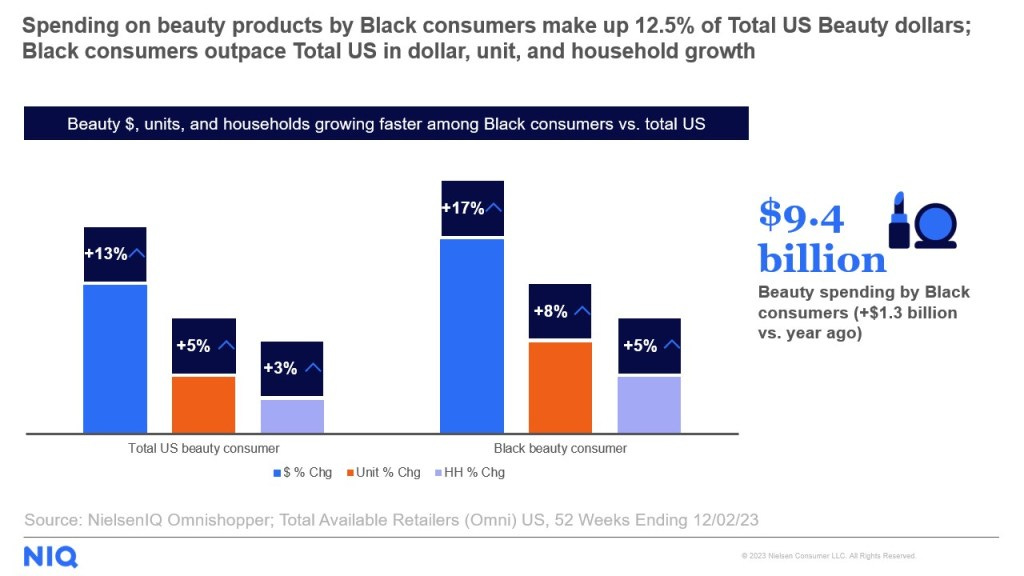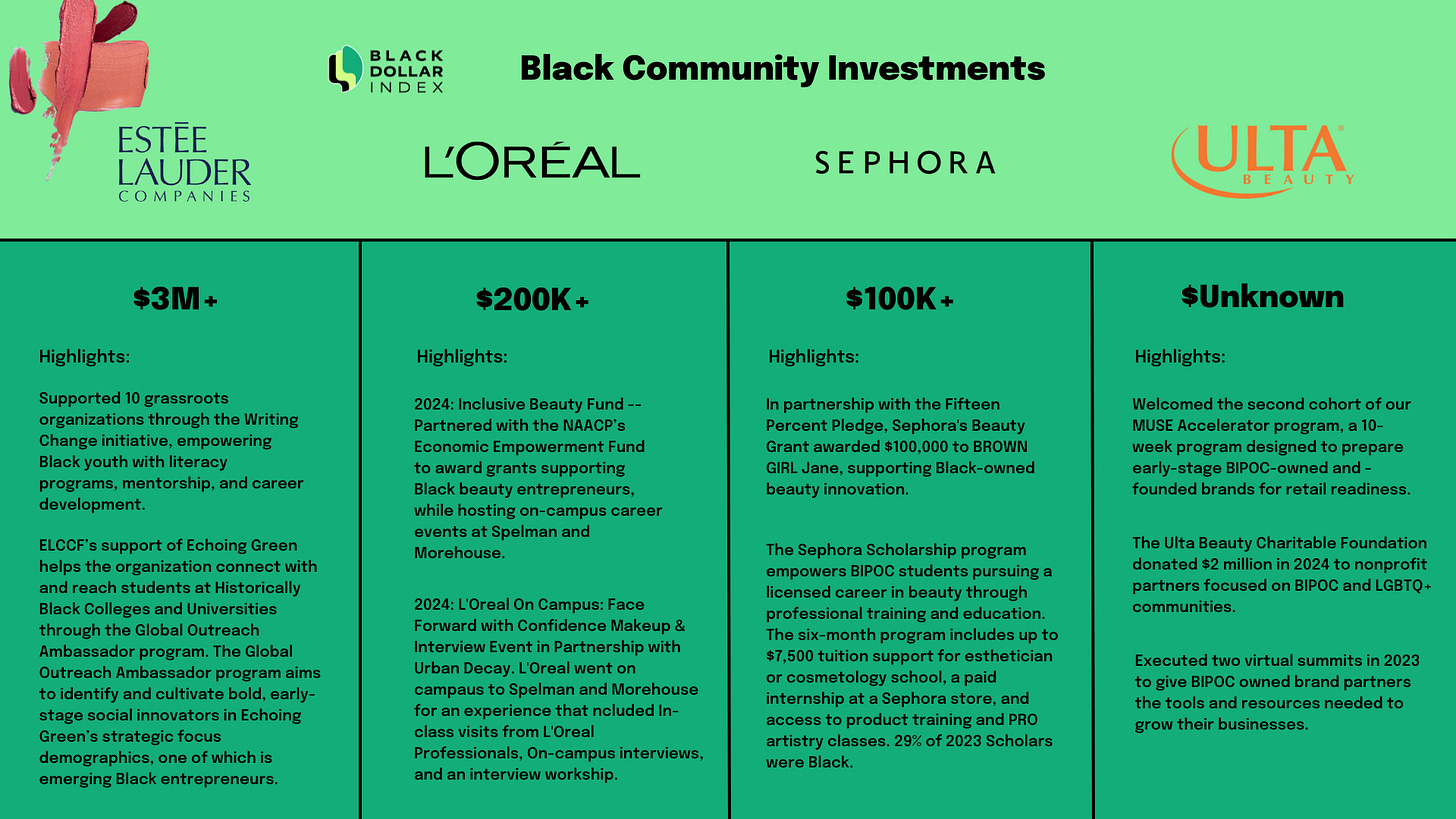Black Equity Guide: Black Buying Power is Shaping the Beauty Industry
Are Your Beauty Purchases Going to Brands That Value Black Consumers?
Whether you’re buying gifts or shopping for your holiday gathering, BDI’s Black Equity Guide is your guide to making a difference with every purchase. Let’s hold corporations accountable and support brands that advance Black equity, all while making your holiday season more meaningful.
“Walks by me every day. Her and love are the same. The woman that's stolen my heart, And beauty is her name”
— Dru Hill
BEAUTY! Let’s get into it. This is one of those categories that Black consumers OVER-INDEX. In fact, Nielsen reported the following in 2018:
But it doesn’t stop there:
Black consumers account for a disproportionate amount of product sales in a number of fast-moving consumer goods categories…
More importantly, the data suggests that Black consumer spending already significantly affects the bottom line in many categories and industries, and brands can’t afford to lose favor or traction with this segment without potential negative impact.
Y’all hear that?????
🗣️ “brands can’t afford to lose favor or traction with this segment without potential negative impact.”
Last year, Black consumers spent $9.4 billion on beauty products, leading the charge in categories like fragrance, hand and body lotion, and hair care. Our buying power is shaping the beauty industry, and we’re making online shopping a major force—especially when it comes to skincare and fragrance, where we’re spending more online than in stores. It’s clear: when we show up, the beauty industry moves. Now it’s on these brands to prioritize us and meet our needs.
So now that we know the impact we make in this category, WHO will get our money?
We dug into a few product-based corporations and retailers to understand how they’ve supported Black consumers and communities — Estee Lauder, L’Oreal, Sephora, and Ulta Beauty. First, here’s more about their brand portfolio’s and Black-owned products carried:
And now for a look at all the ways they support Black consumers and communities:
Disclaimer: The data is a look at the past year and does not account for what may currently be happening behind-the-scenes, considering the DEI cutbacks. As of now, we have not heard any reports of these brands making major cuts.
Black Representation
Overall, there is a lack of transparency and seemingly leadership opportunities for Black professionals at major beauty companies. While Sephora reports 19% Black representation in its workforce, other metrics—like mid-management roles or senior leadership—are either underreported or reflect minimal inclusion; However, per Sephora’s ESG report, 12% of their Managers & above are Black. Estee Lauder stands out across the board, but overall, these numbers show that we still have a ways to go for true equity. And while Ulta’s 2023 EEO-1 report is not available, their 2022 EEO-1 report is, but they did report the following for 2023:
Regular Managerial Employees: 9.3% Black
Regular Non-Managerial Employees: 13.2% Black
2022 EEO-1: Black workforce: 12.9, Mid-Manager: 9.3, Executive/Senior Level Officials & Managers: 0%.
This data prompts the question: Are these brands doing enough to ensure that the people behind their products reflect the communities they profit from?
Supplier Diversity
Supplier diversity is key to supporting Black-owned businesses, yet most companies in the beauty space fall short in transparent reporting. Estee Lauder’s $44M spend stands out, but it’s unclear how this compares across other brands, as most don’t report these figures. Sephora currently carries 28 Black-owned brands, up from 8 in 2020 and they amplify these brands through dedicated monthly campaigns. And as of the end of fiscal 2023, Black-owned, -founded and -led brands made up ~9% of Ulta’s brand assortment store-wide.
CTA: Black consumers can use this data to push for accountability and prioritize brands that actively invest in the Black community.
DEI Initiatives
This breakdown shows which companies are taking active steps toward equity and inclusion within their organizations.
In fiscal 2024, Estee Lauder expanded its partnership with Spelman College, offering professional development and networking to freshmen through the Convocation Lecture Series. The "From Every Chair" program, led by the NOBLE ERG, has supported 230 Black employees across three cohorts. Additionally, a new partnership with AFROTECH enhances access to Black STEM talent at all levels.
While it is unclear whether Sephora and Ulta have official HBCU Pipeline Initaitives, they reported the following:
Ulta executed a “mini HBCU tour” called #JoyForward, to “see how majorettes bond over beauty, movement and sisterhood,” complete with in-store shopping sprees.
Sephora partnered with CultureCon On Campus to visit Clark Atlanta University and provide “interview skill sharpening” with members of their HR team, meet & greet with Sephora Squad members for info on pursuing a creator career, and provide free samples from Black-owned brands.
CTA: Black consumers should push for transparency around actions beyond marketing that center Black talent and leadership.
Community Investments
While dollar amounts aren’t always clear, we do see work being done. However, brands need to stop using broad terms like BIPOC, which hide how resources are distributed. Clear, community-specific reporting—showing exactly how much is invested in Black, Indigenous, and other groups—is key for real transparency, accountability, and ensuring every community gets the support it deserves.
The Estée Lauder Companies (ELC) has advanced several initiatives to support Black talent and communities:
Hair Texture Education: Bumble and Bumble and Aveda supported the Professional Beauty Association’s Texture Education Collective, helping pass a New York law requiring cosmetology licensing to include training on all hair textures.
Girls’ Leadership and Equity: Through Grantmakers for Girls of Color, ELC supported the Black Girl Freedom Fund, part of the #1Billion4BlackGirls campaign, investing in the well-being and innovation of Black girls and gender-expansive youth.
Emerging Black Entrepreneurs: ELC’s partnership with Echoing Green connects HBCU students to mentorship and opportunities for early-stage innovators.
WRITING CHANGE Initiative: A $3 million collaboration with Amanda Gorman funded 10 grassroots organizations advancing literacy and equality through youth mentorship, creative writing workshops, and book donations.
Professional Development Programs: Partnerships with Howard University, Spelman College, AfroTech, COLORCOMM, and the National Black MBA Association provide career coaching, mentorship, networking, and industry exposure for Black talent.
Creative and Marketing Opportunities: ELC supports Black creatives through The One Club's “Where Are All the Black People” conference and professional development programs with The Executive Leadership Council.
FAMU Partnership: ELC’s Travel Retail team engages students at Florida A&M University with networking, scholarships, internships, and a co-taught marketing course.
In 2024, L'Oréal expanded its efforts to support inclusivity and innovation across beauty and education:
On-Campus Engagement: L'Oréal hosted the "Face Forward with Confidence" event at Spelman and Morehouse in partnership with Urban Decay, featuring in-class visits, on-campus interviews, and an interview workshop to empower students with career skills.
Inclusive Beauty Fund: L'Oréal launched the 2024 Inclusive Beauty Fund, providing 40 one-time $10,000 grants to small beauty businesses in collaboration with the NAACP’s Economic Empowerment Fund and the Hispanic Federation.
Research & Innovation: The "My Skin & Hair Journey" study, conducted with Verily, explores skin and hair health for American women, aiming to drive innovation in personalized beauty solutions.
In 2023 and 2024, Sephora launched key initiatives to support Black beauty entrepreneurs, diverse talent, and inclusive retail practices:
Sephora Beauty Grant: Partnering with the Fifteen Percent Pledge, Sephora awarded its first $100,000 Beauty Grant to Black-owned fragrance brand BROWN GIRL Jane to support growth and innovation.
Racial Bias Mitigation: Through the Mitigate Racial Bias in Retail Charter, Sephora united over 80 retailers to establish inclusive shopping practices and foster a welcoming retail environment for all.
Sephora Squad: In 2023, 70% of Squad members identified as people of color, furthering representation in influencer marketing.
Sephora Impact Summit: This inaugural event provided resources, connections, and learning opportunities for BIPOC founders, Sephora Accelerate alumni, and Squad members to fuel entrepreneurial growth.
Accelerate Program: Sephora's incubator focuses on launching BIPOC-owned brands, with more than half of its 2021–2023 participants now available in stores.
Sephora Scholarship Program: Designed to empower BIPOC beauty students, the program offers $7,500 in tuition support, paid internships, and professional training, with 29% of 2023 scholars identifying as Black.
In 2023 and 2024, Ulta Beauty reinforced its commitment to supporting BIPOC-owned brands and diverse communities:
Virtual Summits: Hosted two virtual summits in 2023 to equip BIPOC-owned brand partners with the tools and resources to scale their businesses.
MUSE Accelerator Program: Welcomed the second cohort of this 10-week program, designed to prepare early-stage BIPOC-owned and founded brands for retail success.
Charitable Giving: Donated $2 million in 2024 through the Ulta Beauty Charitable Foundation to support nonprofit partners focused on BIPOC and LGBTQ+ communities.
Racial Discrimination Claims
Two things to note:
Estee Lauder took the right step in removing the executive who used a racial slur, signaling a commitment to addressing overt acts of racism. Such actions MUST be accompanied by systemic changes to prevent similar incidents and foster a genuinely inclusive culture.
Even when corporations "defeat" discrimination lawsuits, it doesn't necessarily mean discrimination did not occur. Legal outcomes often reflect procedural arguments or insufficient evidence rather than an absence of harm, emphasizing the importance of evaluating company culture beyond court rulings.
We hope this info helps guide your beauty and skin care journey. And as always, we advocate for Black-Owned, so check out this gift guide from Black Enterprise to meet your holiday shopping needs. Drop a comment below to share thoughts or more Black-owned options!
Reminder: Be informed, not influenced.
The Black Dollar Initiative is the 501(c)(3) research and data hub that powers the Black Dollar Index. Your donation will go towards helping us research, analyze, and report over 120 corporations across 20+ data points. Donations are tax-deductible (EIN: 85-2383485).
Sources:
Nielsen
https://www.nielsen.com/insights/2018/black-impact-consumer-categories-where-african-americans-move-markets/
https://nielseniq.com/wp-content/uploads/sites/4/2023/01/Diverse-Voices_Black-consumer-influence-and-impact.pdf
https://nielseniq.com/global/en/insights/analysis/2024/black-consumer-spending-in-the-us-beauty-category/
Estee Lauder
https://www.elcompanies.com/en/our-brands
https://www.triplepundit.com/story/2023/estee-lauder-supplier-diversity/791021
L’Oreal:
https://www.loreal.com/en/loreal-luxe/
https://www.loreal-finance.com/fr/system/files?file=2024-03/LOREAL_2023_Annual_Report_3_0.pdf
https://www.loreal.com/en/group/governance-and-ethics/comex-members/
https://www.loreal.com/en/articles/audiences/inclusive-sourcing-q-and-a/#question1
https://news.bloomberglaw.com/litigation/loreal-defeats-ex-vps-racial-disability-discrimination-suit
Sephora:
Ulta:














